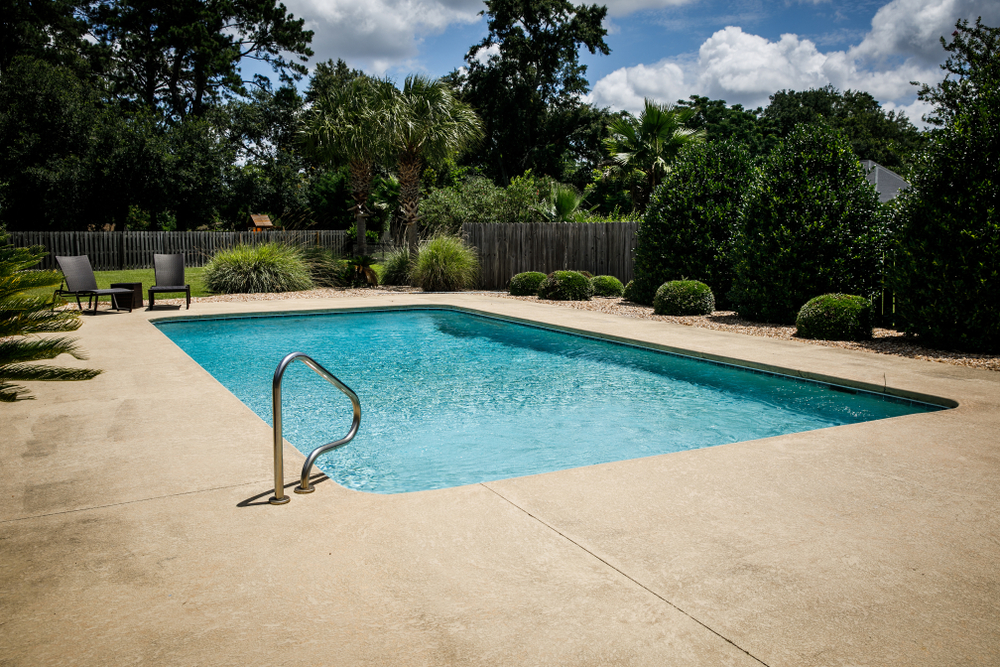When designing and constructing a swimming pool, choosing materials is paramount. The materials you select will not only influence the aesthetics of your pool but also its longevity and ease of maintenance. In this detailed exploration, we will delve into the top five materials that have dominated the realm of swimming pool construction, each bringing its unique qualities to the aquatic tableau.
1. Concrete
Strength and customization
Concrete stands as a titan in pool construction materials, renowned for its durability and versatility. With concrete, the canvas for your pool’s design is boundless. You are afforded the luxury to customize shapes, depths, and sizes, tailoring each curve to meet your precise aesthetic and functional aspirations. Concrete pools can be as simplistic or elaborate as desired, accommodating intricate designs, tanning ledges, and beach entries with grace and structural integrity.
Durability and considerations
A concrete pool offers a robustness that can withstand the test of time and elements, providing a lasting investment for homeowners. However, this durability comes with a requisite commitment to maintenance. Concrete pools necessitate regular brushing to prevent algae infestations owing to their porous surfaces. Further, they require more frequent chemical balancing and periodic resurfacing, which should be factored into the long-term maintenance considerations.
2. Fiberglass
Ease of installation and smooth finish
Fiberglass pools have risen in popularity thanks to their smooth finish and expedited installation process. The shells of fiberglass pools are manufactured off-site and delivered ready to be installed into the excavated site, significantly reducing the construction timeline. The smooth gel-coat surface of a fiberglass pool is not just pleasing to the touch but also resistant to algae growth, promising a cleaner pool with reduced cleaning demands.
Design limitations and longevity
While fiberglass pools offer benefits in terms of maintenance and installation, they carry certain limitations in design flexibility. The pools are limited to the shapes and sizes provided by manufacturers. Despite this, fiberglass boasts remarkable longevity and resistance to wear and tear. The material doesn’t necessitate resurfacing, and its non-porous surface makes for lower chemical usage, translating to cost-effectiveness in long-term upkeep.
3. Vinyl Liner
Cost-effectiveness and design variety
Vinyl liner pools offer an affordable entry into private swimming pools. They present many design options, with liners in various patterns and colors to adorn your pool’s interior. The liners make for a non-abrasive surface, providing a softer underfoot experience. Vinyl pools can also be customized to various shapes and sizes, providing a spectrum of creative possibilities in tailoring your pool’s aesthetics.
Maintenance and durability
Vinyl liners necessitate careful maintenance to avoid punctures or tears. They are susceptible to damage from sharp objects, pets, or pool toys. However, the liners are relatively easy and cost-effective to replace, ensuring that your pool can be readily refreshed and modernized. It’s crucial to consider that vinyl liner pools require a more consistent pH balance to prevent the liner from fading or wrinkling, implicating a more attentive approach to chemical balancing.
4. Stainless Steel
Modern aesthetics and strength
Stainless steel emanates a modern, sleek allure, infusing pools with a contemporary sophistication. Beyond aesthetics, stainless steel pools triumph in strength and durability. They stand resilient against fluctuations in temperature and weather conditions. The non-porous surface of stainless steel pools hinders the growth of algae and bacteria, promoting a cleaner and more hygienic swimming environment.
Cost and installation
Stainless steel pools tend to lean towards the higher end of the cost spectrum, reflecting their durable and low-maintenance nature. The installation process can be more intricate, requiring specialized knowledge and expertise. However, stainless steel offers a remarkable return on investment, owing to its longevity and minimal maintenance requirements, establishing it as a worthwhile consideration in premium pool construction projects.
5. Ceramic Tiles
Elegance and customization
Ceramic tiles elevate swimming pools with a touch of elegance and artisanal charm. They offer an expansive palette of colors, patterns, and designs, allowing for extensive customization in creating a unique and captivating pool interior. Ceramic tiles are not just about aesthetics; they also provide a durable and resilient surface that stands steadfast against wear, imparting long-lasting beauty to your pool.
Maintenance and considerations
Ceramic tiled pools require a meticulous approach to maintenance to preserve their allure. The grout lines between the tiles can become a haven for algae and bacteria if not regularly and adequately cleaned. However, the tiles themselves are easy to clean and resistant to chemical damage, maintaining their vibrancy and aesthetic appeal over time.
Conclusion
The materials you choose in constructing your swimming pool lay the foundation for its beauty, durability, and ease of maintenance. Armed with insights into the benefits and considerations of each material, you are well-placed to make an informed decision that aligns with your vision and practical needs.
At Phoenix Pools and Spas, we bring expertise and passion to craft backyard swimming pools that resonate with quality, elegance, and functional excellence. Reach out to us to embark on a transformative journey that turns your backyard into a realm of aquatic delight and architectural wonder!

